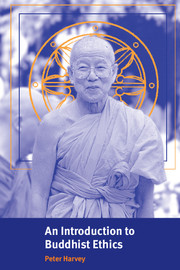Book contents
- Frontmatter
- Contents
- List of plates
- Acknowledgements
- List of abbreviations
- A note on language and pronunciation
- Introduction
- 11 THE SHARED FOUNDATIONS OF BUDDHIST ETHICS
- 12 KEY BUDDHIST VALUES
- 13 MAHĀYĀNA EMPHASES AND ADAPTATIONS
- 14 ATTITUDE TO AND TREATMENT OF THE NATURAL WORLD
- 15 ECONOMIC ETHICS
- 16 WAR AND PEACE
- 17 SUICIDE AND EUTHANASIA
- 18 ABORTION AND CONTRACEPTION
- 19 SEXUAL EQUALITY
- 10 HOMOSEXUALITY AND OTHER FORMS OF ‘QUEERNESS’
- Glossary and details of historical figures and texts
- List of references
- Useful addresses
- Index of Buddhist texts, schools cultural areas, movements and organizations
- Index of concepts
- Index of names
14 - ATTITUDE TO AND TREATMENT OF THE NATURAL WORLD
Published online by Cambridge University Press: 05 June 2012
- Frontmatter
- Contents
- List of plates
- Acknowledgements
- List of abbreviations
- A note on language and pronunciation
- Introduction
- 11 THE SHARED FOUNDATIONS OF BUDDHIST ETHICS
- 12 KEY BUDDHIST VALUES
- 13 MAHĀYĀNA EMPHASES AND ADAPTATIONS
- 14 ATTITUDE TO AND TREATMENT OF THE NATURAL WORLD
- 15 ECONOMIC ETHICS
- 16 WAR AND PEACE
- 17 SUICIDE AND EUTHANASIA
- 18 ABORTION AND CONTRACEPTION
- 19 SEXUAL EQUALITY
- 10 HOMOSEXUALITY AND OTHER FORMS OF ‘QUEERNESS’
- Glossary and details of historical figures and texts
- List of references
- Useful addresses
- Index of Buddhist texts, schools cultural areas, movements and organizations
- Index of concepts
- Index of names
Summary
May all beings be happy and secure.
Karaṇīya-metta Sutta, Khp. 8HUMANITY'S PLACE IN NATURE
Buddhism does not see humans as a special creation by ‘God’, or as having been given either ‘dominion’ or ‘stewardship’ over animals etc. Like all other sentient beings, they wander in the limited, conditioned realm of saṃsāra, the round of rebirths. Nevertheless, a human rebirth is seen as a very rare and fortunate one – a ‘precious human rebirth’ (see p. 30) – as it is the only one where the key work for enlightenment can be accomplished. Accordingly, in the Buddhist account of the types of rebirth – gods, humans, animals, ghosts and hell-beings – humans are listed in one group, while all other animals (i.e. land animals, birds, fish, worms, insects: M. 111.167–9) are listed in another. That is, while all sentient beings are ‘in the same boat’ – saṃsāra – humans are in a specific compartment of this. This is because they have a greater freedom and capacity for understanding than animals (and a greater motivation for spiritual progress than gods). Most moral and spiritual progress, or its opposite, is made at the human level. This is not to say that animals are all seen as amoral automatons. Buddhist Jātaka stories often attribute noble actions to such animals as monkeys and elephants, and there is also a reference to some animals keeping the five precepts (Vin. 11.162).
- Type
- Chapter
- Information
- An Introduction to Buddhist EthicsFoundations, Values and Issues, pp. 150 - 186Publisher: Cambridge University PressPrint publication year: 2000
- 2
- Cited by



